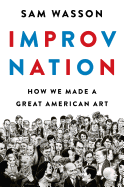
Improvisational theater was invented and developed in the 20th-century United States, and continues to be a life spring of new ideas and talent for the performing arts, TV and film. Sam Wasson (Fosse) spent years writing Improv Nation from archival research and scores of interviews. The result is encyclopedic, garrulous and funny.
Improvisational theater requires its players to be receptive and generous with each other, competitive but also trusting, and to be fearless in front of an audience. The first games and rules of improv were devised by Viola Spolin, a Jewish Chicagoan working at the famous Hull House, which served new immigrant populations in Chicago. Working with children and then with adults at the Chicago WPA Recreation Project during the Great Depression, she developed "Theater Games" that encouraged people to open up and play together spontaneously onstage. Spolin's son, Paul Sills, founded the Compass Theater, whose members included the brilliant comedy duo Nichols and May. Some of its members went on to found the famous and influential Chicago improv theater Second City, which opened in 1959 to such instant success they didn't have to advertise. New theaters were founded in cities across the country, and the age of improv had arrived.
Wasson often seems thrilled and dazzled by his famous subjects, and his enthusiasm permeates this book. He has organized it chronologically, with reference to the major political and cultural events of each period. The intertwined story lines and Wasson's frequent digressions can sometimes feel a little chaotic, but the creative and social joy of improvisational theater, and the application of its principles to daily life, are the unifying themes. --Sara Catterall

